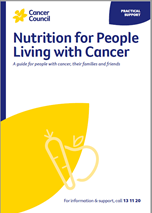- Home
- Cancer of unknown primary (CUP)
- Managing symptoms & side effects of CUP
- Loss of appetite
Loss of appetite
Not feeling like eating is a common problem faced by people with CUP. This may be caused by the cancer itself or side effects of treatment. You may not enjoy the way food tastes or smells, or you may be worried about the diagnosis and treatment. You might also not want to eat much if you are feeling sick (nauseated) or have a sore mouth or oral thrush infection. These problems can often be managed, so let your treatment team know.
You may go through periods of having no appetite. These may last a few days or weeks, or be ongoing. During these periods, it may help to have liquid meal substitutes. These are high-kilojoule drinks containing some of the major nutrients needed by your body. Drinking these may help keep your energy levels up during periods when your appetite is poor.
Tips for when you don’t feel like eating
- Have small meals and snacks frequently throughout the day.
- Use small dishes so food isn’t “lost” on the plate (e.g. serve soup in a cup).
- Use lemon juice, fresh herbs, ginger, garlic or honey to add more interesting flavours to food.
- Sip fluids throughout the day. Add ice-cream, yoghurt or fruit to drinks to increase kilojoules.
- Choose full-fat foods over low-fat, light or diet versions.
- If you have a sore mouth, eat soft food, such as scrambled eggs or stewed fruit.
- Ask your dietitian or doctor to recommend the right nutritional supplement for you to help slow weight loss and maintain your muscle strength.
Podcast: Appetite Loss and Nausea
Listen to more episodes from our podcast for people affected by advanced cancer
Video: How to eat well after a cancer diagnosis
More resources
Prof Chris Karapetis, Network Clinical Director (Cancer Services), Southern Adelaide Local Health Network, Head, Department of Medical Oncology, and Director, Clinical Research in Medical Oncology, Flinders Medical Centre and Flinders University, SA (Clinical review); Dr Amey Aurangabadkar, Radiologist, Illawarra Radiology Group, NSW; Clare Brophy, Consumer; Prof Katherine Clark, Clinical Director of Palliative Care, NSLHD Supportive and Palliative Care Network, Northern Sydney Cancer Centre, Royal North Shore Hospital, NSW; Prof Wendy Cooper, Senior Staff Specialist, Tissue Pathology and Diagnostic Oncology, NSW Health Pathology, Royal Prince Alfred Hospital, NSW; A/Prof Richard Gallagher, Head and Neck Surgeon, Director of Cancer Services and Head and Neck Cancer Services, St Vincent’s Health Network, NSW; Dr Chloe Georgiou, Oncology Research Fellow, Australian Rare Cancer Portal, and Oncology Trials Fellow, Bendigo Health Cancer Centre, VIC; Dr Susan Harden, Radiation Oncologist, Peter MacCallum Cancer Centre, VIC; Justin Hargreaves, Medical Oncology Nurse Practitioner, Bendigo Health Cancer Centre, VIC; Dr Laura Kirsten, Principal Clinical Psychologist, Nepean Cancer Care Centre, NSW; Prof Linda Mileshkin, Medical Oncologist, Peter MacCallum Cancer Centre, VIC; Caitriona Nienaber, 13 11 20 Consultant, Cancer Council WA.
View the Cancer Council NSW editorial policy.
View all publications or call 13 11 20 for free printed copies.

